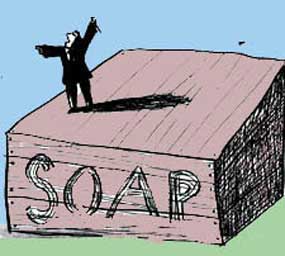Sigrid Macdonald’s post this week about multi-tasking resonated with me in a major way because I’m about to dive headfirst into multi-tasking hell. Earlier this year I went round and round with a decision about going back to school and finally decided to take the plunge and dive into the Recording Arts For Film program at Tribeca Flashpoint Media Academy in Chicago.
The TFA program features an immersive, hands-on approach, and it’s not your traditional pick-your-classes-and-attend-when-it’s-convenient schoolhouse. Instead, your schedule is chosen for you based on your career choices and you put in an eight hour day. Which necessitates me having a night shift for freelance work.
Yes, I decided to stay freelance with my current work load, keeping all my current clients, shifting my work to the evening hours instead of first thing in the morning the way I’m used to working.
I won’t accept any new projects after Saturday, when the first official TFA event happens (a student/faculty mixer, but official nonetheless), but my current clients will never notice any difference in deliverables, quality of work, etc.
How do I know? Well, it’s simple really–I’ve done all this before. AND worked a second job on top of it. None of my clients ever realized I was doing anything BUT working on their projects. And that is the way I like it. It’s as it should be.
All this is terribly self-promotional–or at least it sounds it–but there’s a reason why I share any/all of this. I’m going to be blogging about the whole experience here as it unfolds. I may have done this before, but there are always new lessons to be learned, especially when you’re multi-tasking at such a type-A workaholic level. It can be done. In my case, it WILL be done…and I’ll write about it all here on top of everything else.
A freelancer’s most important asset is his or her flexibility. If you can’t bend with the circumstances, your skills are pretty much useless in terms of earning a decent living. You might be able to scrape by with a rigid, uncompromising approach to your work, but you’ll never get off the treadmill unless you can master the Judo of freelancing.
And that’s what I intend to explore once again in my experiences at TFA, in addition to all the film audio work I’ll be doing and learning. Foley, field recording, sound effects, game audio design, dialogue looping, post-production…a whole universe of sound and plenty of opportunities for a freelancer to move ahead in a different–but related–field.
In fact, even before classes start, I’ve found some interesting freelance fodder in the textbooks. One entire textbook is a guide for audio engineers on how to carve out a career as a self-employed person. Substitute your discipline of choice–writing, editing, marketing, coding–and this book still resonates. I’ll be running a review of it in the near future, but for now, suffice it to say that my journey begins here, on the threshold. I’m happy to bring you along for the ride.
Joe Wallace is a writer, editor, multi-media visual artist, and now a student again. He may be the only one in his classes outside the faculty who remembers Gerald Ford as President, but at least he still has most of his knee cartilage. For now. Wallace blogs about multi-media production and indie film making at www.now-sound.com and vinyl records at www.turntabling.net.





